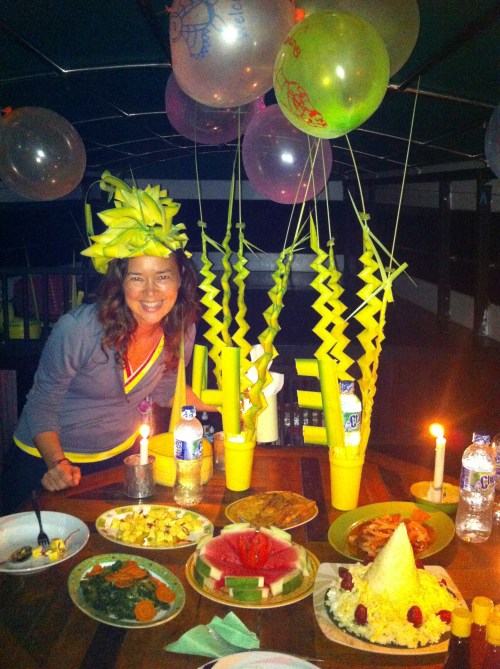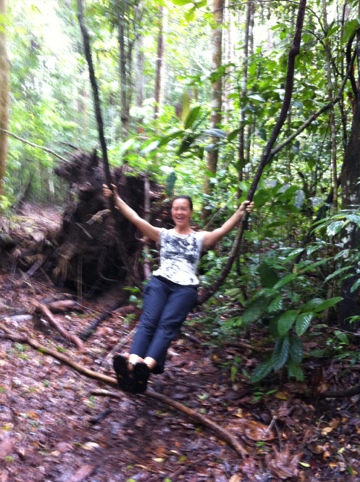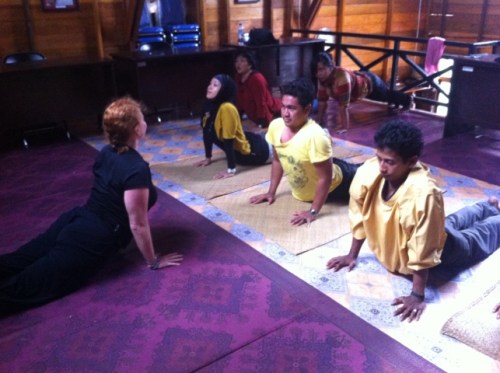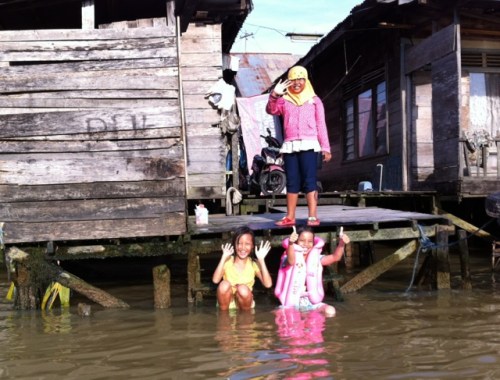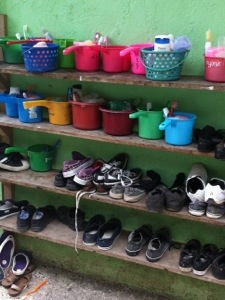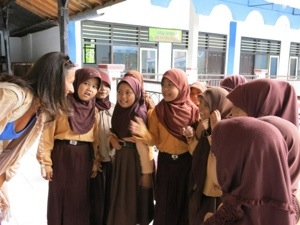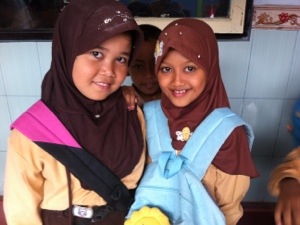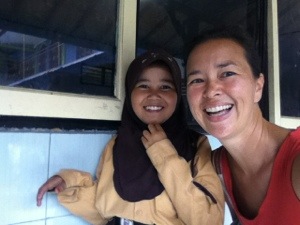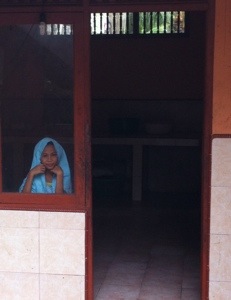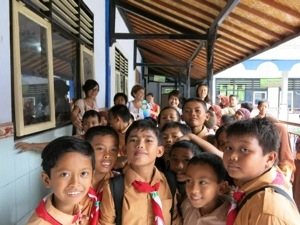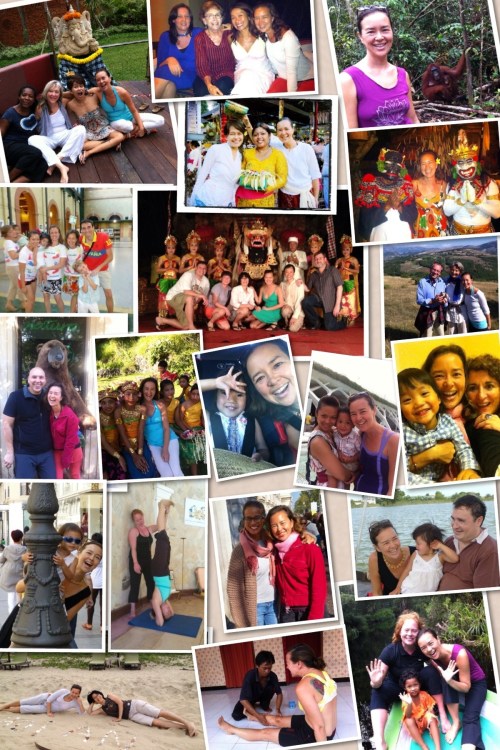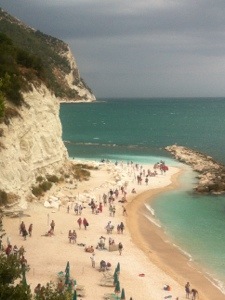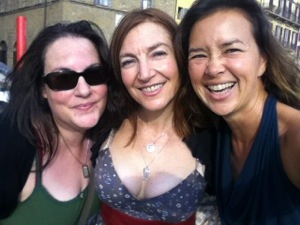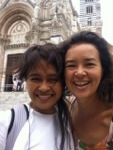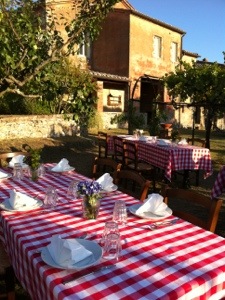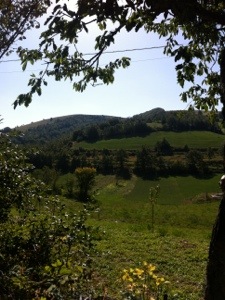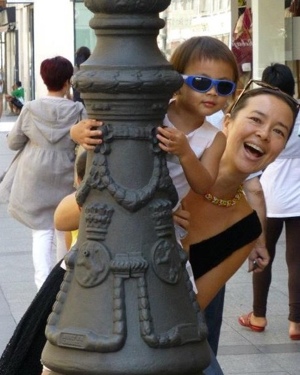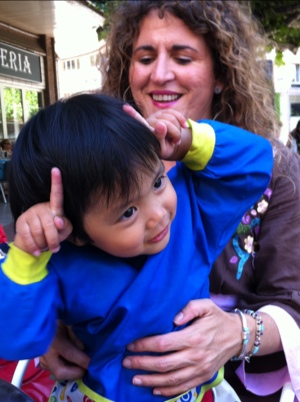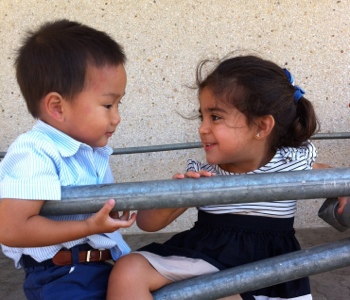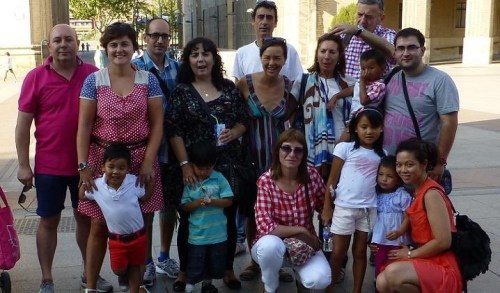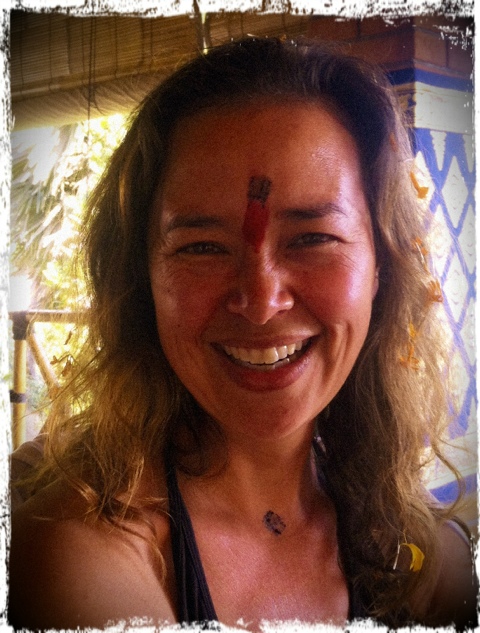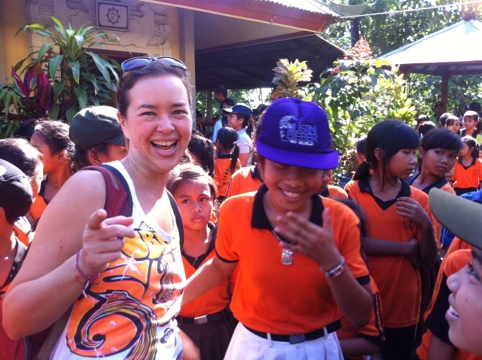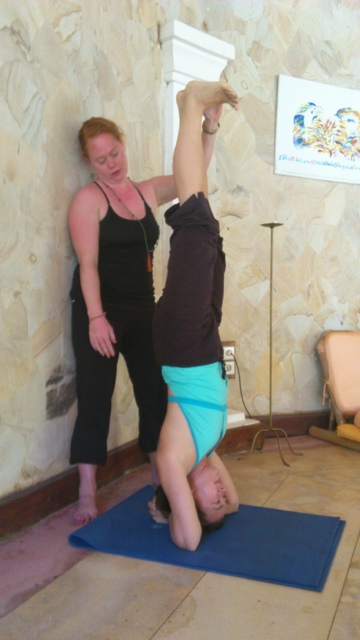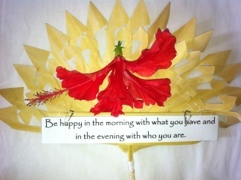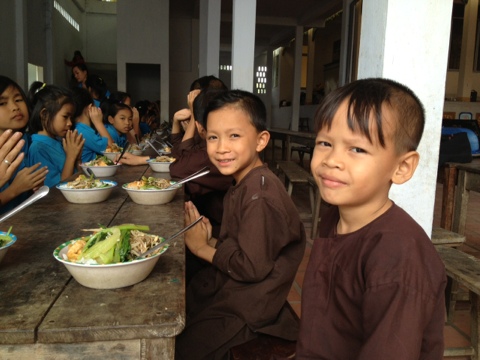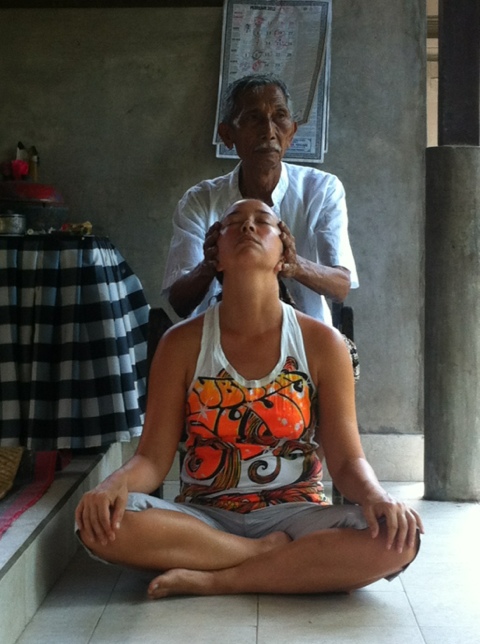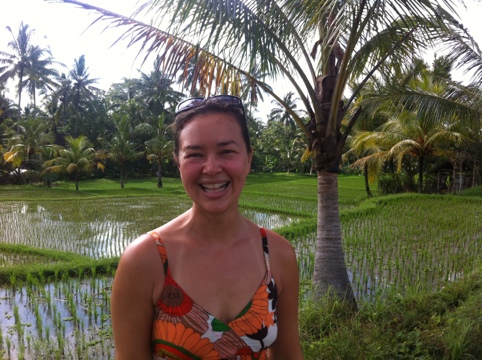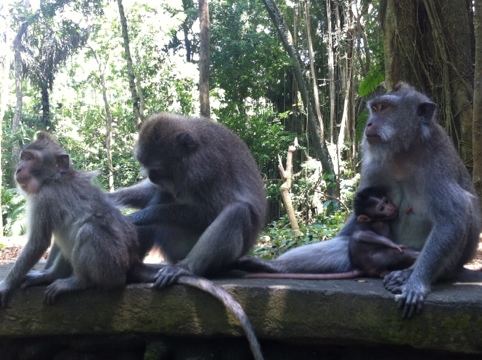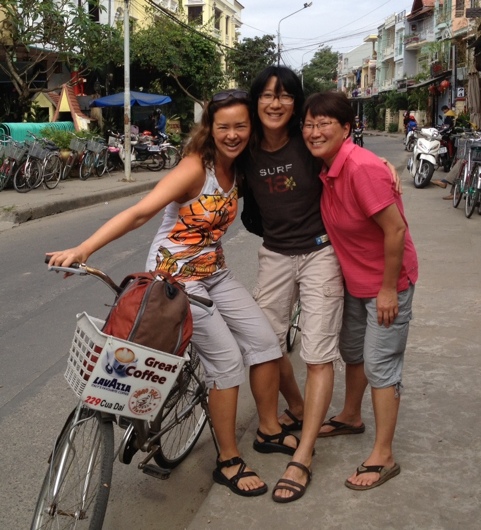After many months of comfort in Ubud, Bali, I venture south to Canggu, Bali to meet my friend, Anne-Louise, for a 3 ½ day Anusara Yoga and Anatomy workshop. These days, I’m just amazed at my once fragile and fatigued body’s ability to do new yoga positions. The workshop deepened my yoga practice and I leave with a renewed sense of strength.
Anne-Louise is a BBC producer/yoga instructor from England. In Bali, I’m always meeting women with high-powered stressful careers, who are transforming their lives to follow their bliss — tax attorneys/tarot card readers, financial analysts/personal assistants, and stock brokers/spa managers. She’s been in Bali for 8 months, and like me, feeling the need to travel off the ex-pat and tourist trail. Ever the producer, she’s planned a 10-day adventure in Kalimantan, Indonesian Borneo that is primarily Muslim. Anne-Louise tells me to pack light, chiding me when I want to pack three dresses and two bikinis. I pare it down to one dress and one bikini that never reach the light of day. I scoff at her for packing a mosquito bed-net, gaiters, syringe (in case we need a clean one in a hospital!) and Colloidal Silver. The joke is on me since we have used three out of four items on our trip.
Our journey begins with a three-day river cruise in Tanjung Puting, home to several orangutan sanctuaries. We commission a huge boat with a crew of four: guide, captain, cook and assistant, and the cook’s 6-year old daughter. In an effort to get a good deal, I’m forever mentioning my birthday (special birthday price?). The boat pulls over and the machetes come out, the crew hacks down foliage to weave hats and decorations for my birthday celebration. They even manage to find some balloons, cook a birthday feast, sing Indonesian songs and I feel so blessed to spend my birthday in Borneo with my new friends. We sleep on the outdoor deck on mattresses under a mosquito net, and every day feels like a National Geographic special. We go to several orangutan feeding sessions and are just floored by these gentle shy creatures, that only exist in Borneo and Sumatra. We go on a night walk, hoping to see some unusual nocturnal creatures. Besides bats and bugs, the most exotic thing we see are LEECHES! Anne-Louise has loaned me her gaiters, which I’ve worn over my Capri pants tucked into my socks. Somehow, leeches still manage to wiggle their way under my pants, but fortunately I detect them before they attach themselves to my skin. Our guide is not so lucky since he’s only wearing Crocs and we collectively groan from the blood-swelled creature, which wriggled off promptly when coated with tiger balm. Anne-Louise is always bemoaning the state of hygiene on our trip. We have a few hours of electricity a day, with a functioning shower. After she learns the shower pumps water from the river (which our squat toilet dumps into) she politely asks for a bowl of hot water for bathing each morning. With her British accent, all her requests sound delightfully charming. I always tease her, “What’s a little fecal matter between friends?”
We retain our guide to travel to Tanjung Keluang. I rarely travel with guides, but am quite happy with our choice when we arrive to the turtle sanctuary on a small island. The staff of ten young men doesn’t know what to do with us, since they have never had an overnight guest (Indonesians only go for day trips). In an effort to break the ice, I immediately start promoting Anne-Louise as a yoga instructor. She had taught the boat crew yoga and they had responded enthusiastically, and this group is even more engaged. In addition to 6 male staff, she also teaches three visiting women; all first-time yoga students. Yoga has been a bonding element for this trip, and all the women hug and kiss us after the class, grateful for their first yoga lesson. The staff are very sweet, even leaving the generator on all night with the light on in case we want to use the toilet (we grimace at this waste but are grateful for their kindness). Sharing one squat toilet with ten men is not our favorite event, and we laugh that they place their can of toothbrushes inches away from the toilet (hello backsplash!). After days of pee-stained feet, we decide to splurge on a three-star hotel with hot showers, flush toilets, air conditioning, cable TV and wifi.
Next on the itinerary is Banjarmasin, a large city in Southern Kalimantan where we hope to arrange a guide for rural trekking and staying in longhouses with Dayak tribes. Many guides approach us on the street, but they are all locals that don’t venture out of town. One guide tells us he is passing through Kandangan, a three-hour drive away and en route to our destination, and Anne-Louise jokingly tells him they should drive us for free. After a private discussion between the guide and driver, they tell us they will drive us for free, if we meet them outside the airport because they are dropping off guests and don’t want to double-back into town. We are completely shocked by the offer, but Anne-Louise is immediately suspicious and tells them we will call them later. Besides being a hygiene freak, Anne-Louise is also a bit paranoid. She’s had some negative travel experiences, and has an active imagination. She tells me in a British schoolmarm voice, “There’s no such thing as a free lunch.” I disagree, telling her I instinctually trust the guide. She googles his name, learns he is cited in travel guides, and cross-checks his phone number to authenticate his identity. After exploring other expensive, or exceedingly complicated options, we agree to the free ride. When we meet the guide the following morning, he is very gracious and tells us we are stopping soon for the driver to eat breakfast. While we are waiting in the car, an old lady approaches us to sell us street food. Although Anne-Louise buys the baked items, she quietly confides in me that maybe the guide told the women to sell us drugged food so they could kidnap us for ransom! As she’s snacking away, the guide tells us we are going to pick up a woman to drive with us. Anne-Louise takes me aside, telling me if they pull a switcheroo and a man gets into the car we should make a polite excuse and find another ride. As we pull away from the parking lot, we enquire about the missing female passenger and learn she’s not joining us and was the driver’s friend’s niece. I silently smile at Anne-Louise, my faith affirmed in the kindness of strangers.
We arrive safely in Loksado, a small village nestled in the foothills of Maratus Mountains. Surprisingly, we are the only guests at this 16-room river lodge. They have electricity a few hours a day, through a generator, and we are thankful for a western toilet even though we flush it with buckets of water. We hope to spend two nights in the river lodge, going on local treks and bamboo rafting. But it is impossible to find a guide, even though we repeatedly ask the lodge staff and in the nearby town. We realize foreigners must be a rarity when people repeatedly pull over on their motorbikes, asking to take photos with us, the exotic foreign tourists.
Every day is filled with negotiations. Fortunately, Anne-Louise speaks a decent amount of Bahasa Indonesia, the national language, but it also means I become a bit lazy and leave the logistics to her. It’s a welcome break, since I typically make the travel arrangements and bargain for my friends. Bartering is standard procedure in Southeast Asia, but Borneo brings it to a whole new level that is quite comical. The game begins when we ask for a service or item. They repeat our request numerous times, phrasing it differently each time, lighting up a cigarette and staring off into space. Frequently, they disappear for awhile to discuss it with others. When they return, they ruminate on our request again (and again) and finally state an exorbitant figure. Anne-Louise and I have already discussed in advance our ideal price and top price, so she immediately responds with our desired price. Our latest tactic is for me to walk away, so she has to find me to discuss the new price after they’ve countered with their price. It can sometimes take HOURS. We find this particularly amusing because we are usually the only tourists in town. We always pay more then we should, knowing the amount is generally inconsequential to us, but a great deal of money for them.
When faced with extreme poverty, I always think about my mother’s childhood growing up without electricity or running water, and how in one generation our family’s life has been transformed. My life is so absolutely golden and I count my blessings every single day.
